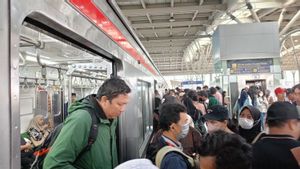TANGERANG - Balai Besar (BB) Karantina Agricultural Soekarno-Hatta (Soetta) Tangerang, Banten destroyed as many as 30 phyton snakes (sanca) from the United States (US).
Dozens of snakes were destroyed by burning using an "incenerator" machine at the South Perimeter Street Animal Quarantine Installation, Soetta Airport, Tangerang, Wednesday, August 9.
"The phyton snake comes from the United States as many as 30 tails. Yesterday it was alive, (before being destroyed) it was turned off first," said Head of the Soekarno-Hatta Agricultural Quarantine Center, Andi PM Yusmanto, as reported by ANTARA.
The destruction was carried out because shipments to Indonesia did not comply with the provisions.
The inclusion of agricultural commodities, both animals and plants, he said, must be equipped with a Health Certificate from the country of origin or receive a recommendation from the relevant ministries. If it does not meet the requirements, it will be confiscated and destroyed.
"Generally it is not equipped (Health Certificate), some are actually equipped, but we will re-check, check and check. So if there are goods in, we will check, because there could be contamination during the process of sending from the country of origin to Indonesia," he said.
In addition to the phyton snake, he said, the Soekarno-Hatta Quarantine Center also destroyed 922 other animal commodities, 8 variant lizards and meat and 379.04 kilograms consisting of chicken meat.
Then beef, pork, venison,teucine and camel meat which are the results of the prevention during the period January to July 2023.
Meanwhile, from agricultural and plant commodities, as many as 212,118 kilograms of vegetable seeds from the Netherlands were also destroyed because they were infected with the Pseudomonas syringae pv. syringae which is a quarantine plant-disturbing organism (OPTK) category A1 (not yet found in Indonesia).
There are also homalomena seeds, rhapidophora seeds, wine seeds, carrots seeds, ornamental plants, cacti, manga fruit, avocado fruit, ghysophilla and ginseng with 582,644 kg, 2442 stems and 40 packaging.
"The carrier media comes from various countries such as the Netherlands, South Korea, Thailand, China, Japan, Ecuador, and Malaysia," he said.
For Pseudomonas syringae pv bacteria. syringae is a pathogen of the negative Gram bacteria class which has a very wide range of hosts of up to 87 types of plants. These bacteria can attack chili, orange, rice, onions, cucumber and tomatoes plants.
"You can imagine if this bacteria manages to enter the territory of the Republic of Indonesia, then this type of plant that can host will be threatened. We will send NNC (notification of non-compliance) to the country of origin, so that in the future nothing will happen the same," said Andi PM Yusmanto.
The English, Chinese, Japanese, Arabic, and French versions are automatically generated by the AI. So there may still be inaccuracies in translating, please always see Indonesian as our main language. (system supported by DigitalSiber.id)













